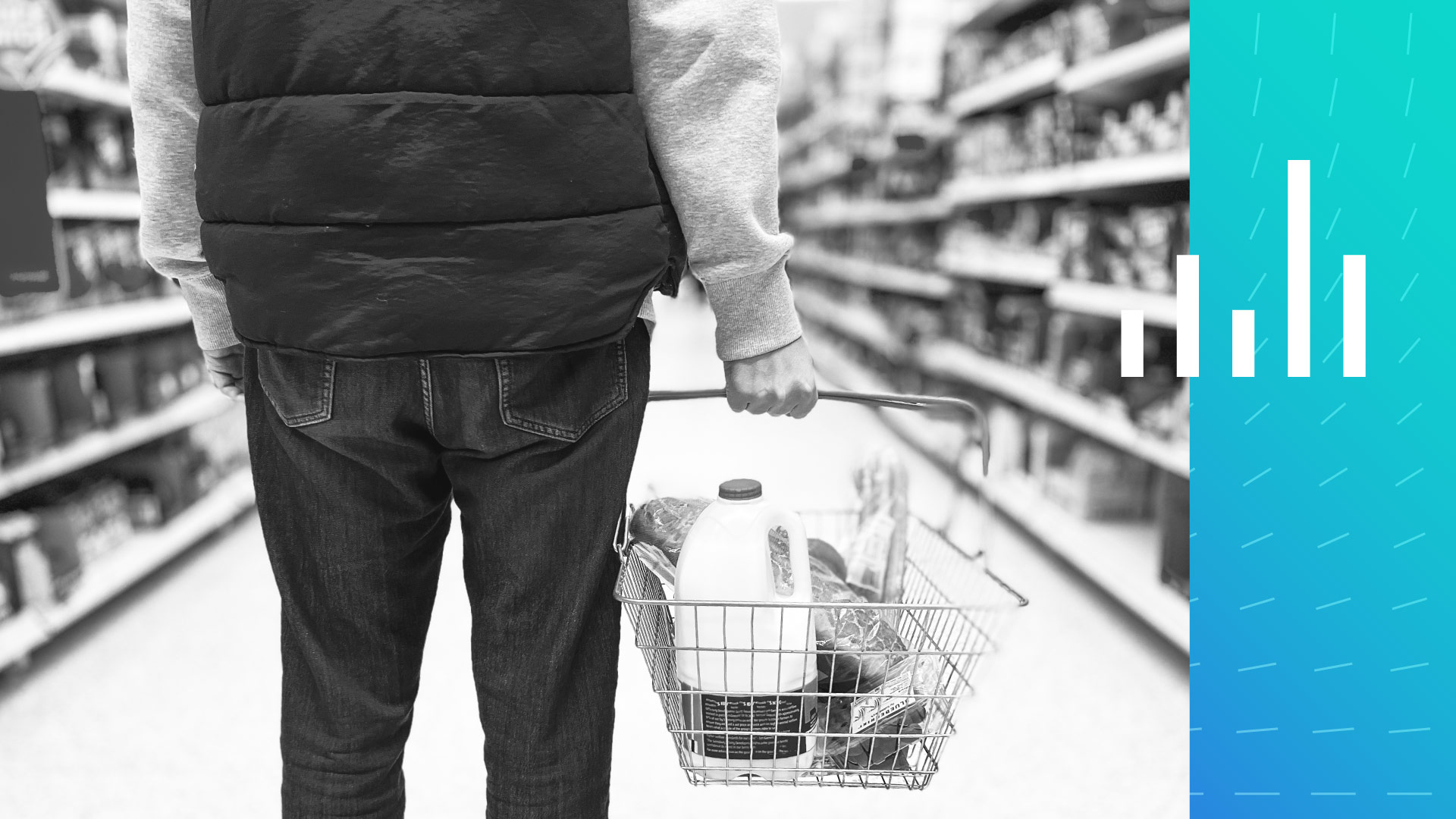Nearly Half of Americans Aware of Recent Food Recalls, Yet Most Trust the Industry

Key Takeaways
Nearly half (47%) of U.S. adults have seen, read or heard “some” or “a lot” about food and beverage recalls in the past six months.
Despite high-profile recalls, a majority (62%) of U.S. adults trust the food and beverage industry to provide safe products.
Most consumers believe it’s the job of the federal government to ensure food safety, and layoffs at government agencies are causing concern.
Data Downloads
Pro+ subscribers are able to download the datasets that underpin Morning Consult Pro's reports and analysis. Contact us to get access.
One minute you’re heating up your favorite frozen pizza, and the next, you’re Googling “symptoms of listeria.” Food recalls have a way of sneaking into consumers’ kitchens, raising concerns — often when they least expect it — about the safety of the things they eat and drink. As high-profile outbreaks make the news (more than ever in 2024), Americans are processing them with both concern and skepticism. But ultimately, they haven’t shaken trust in the food and beverage industry as a whole — at least, not yet.
Food and beverage recalls capture more consumer attention than other categories
For many reasons — more press coverage, frequent purchases in the category, a higher concern level about the effects of impacted products — consumers are more likely to be aware of recalls and related illnesses in the food and beverage industry than in other sectors. Nearly half of U.S. adults (47%) said they had seen, read or heard “some” or “a lot” about recalls on food and beverage items in the past six months, and 43% said the same about illnesses related to food and beverage recalls.
In comparison, 39% had heard “some” or “a lot” about recalls on cars or auto parts, 29% on baby products, and 25% on over-the-counter medications and consumer electronics.
Consumers have heard most about food and beverage recalls and related illnesses
Recent food and beverage recalls have impacted brands from smaller, lesser-known entities to those as prominent as McDonald’s, which recalled its famous Quarter Pounder due to an E. coli outbreak. Naturally, the prevalence of recall coverage raises concerns about food safety. Broadly, more than 3 in 5 U.S. adults (62%) say they’re “somewhat” or “very” concerned about food safety.
Certain groups are on higher alert than others, including millennials and high earners, who are more likely to say they are concerned (69% and 68%, respectively). Perhaps intuitively, the group most likely to say they’re concerned are those with food allergies in their households — 72% expressed concern, with 36% saying they’re very concerned.
Of course, the stakes for this group are higher, with reactions to allergens that range from mild to severe and even deadly. And given that more than one-third of food recalls in 2024 were due to undisclosed allergens, they have reason to be worried. Most importantly for the industry, regulators and overseers, this group is sizable: 18% of U.S. adults say they or someone in their household has a food allergy.
Concerns about food safety haven’t translated to low trust in the industry
Despite heightened awareness of recalls and resultant safety concerns, Americans express similar levels of trust in the food and beverage industry as in other sectors where recalls are likely to occur, such as baby products, auto and consumer electronics. Overall, 62% of U.S. adults say they trust the food and beverage industry “some” or “a lot” to provide safe products for consumers, while 12% say they do not trust the industry. (All sectors slightly outperform pharmaceuticals when it comes to consumer trust.)
Notably, when asked about specific products within the food and beverage category, trust is even higher. At least 64% of U.S. adults say they trust the industry “some” or “a lot” to provide safe packaged foods, dairy, eggs, meat, and produce. Trust is highest in the produce sector — 72% of adults say they trust the industry to provide safe products in this area. But it’s also notable that, even after the egg sector being in the spotlight related to bird flu concerns, nearly two-thirds of consumers (65%) say they have “some” or “a lot” of trust in it.
Consumer trust is highest in fresh produce
That said, while trust in the industry and its sectors in the abstract may be solid, individual food and beverage companies that recall products are more likely to experience a dent in brand metrics. Morning Consult Brand Intelligence data shows that net trust (defined as the share of U.S. adults who say they trust a brand minus the share who say they don’t) in one food and beverage brand that experienced a major recall in 2024 was notably lower after the recall than in previous years. At the same time, negative buzz for the brand was heightened, suggesting a relationship between the news about the recall and trust in the brand. Trust has since climbed back to pre-recall numbers, and negative buzz has subsided, but even a temporary dent undoubtedly impacted the company.
This suggests that consumers attribute more responsibility to the company or brand itself than they do to the industry as a whole, or any oversight, and that recalls are more damaging to reputation on the micro level.
Most consumers believe the federal government is ultimately responsible for food safety
Despite demonstrated impact on reputations of individual brands, a slight majority of consumers don’t believe brands and companies should be the ones primarily responsible for ensuring food safety. Just over half (51%) of U.S. adults say government agencies such as the FDA, USDA and CDC should be the entities in charge of safety in the food and beverage industry. A smaller share of consumers attribute responsibility to farmers and food manufacturers (10%), while 25% say it’s on the brand or company.
Notably, opinions differ when it comes to consumer products more generally: a far lower share say the federal government should be in charge of the safety of products in categories outside food and beverage (26%), while 29% say the onus is on the company or brand, and 31% say it’s on the manufacturer in these sectors.
There are some demographic differences in consumers’ outlook on food safety, though. For example, women are more likely than men to hold government agencies responsible, as are older consumers, specifically baby boomers. And while Gen Zers are less likely to think the government is accountable, they’re also less likely to say the onus is on the brand, instead being more likely to assign responsibility to the consumers themselves. But perhaps most notable is the different outlook from those who have been sick or injured by a past recalled product. They are far less likely to say the government should be responsible, and instead of assigning that role to the brands, are more likely to put it on grocery stores and retailers than any other group.
Consumers think the government is more responsible than brands, retailers and manufacturers for food safety
Given the level of ownership consumers overall assign to the government when it comes to food safety, it’s intuitive that shakeups at the federal level are concerning to many. Around one-third of U.S. adults say they’re “very concerned” about recent or impending layoffs at the FDA (33%), USDA (32%) and CDC (32%). While trust in the industry is solid now, reductions in oversight may contribute to some shaken faith amongst consumers, especially if high-profile recalls gain traction in the news in 2025.
Of course, all of this coincides with the mainstreaming of the “Make America Healthy Again” movement — one that questions the overall practices of major players in the food and beverage industry and is led by current Health and Human Services Secretary Robert F. Kennedy Jr. Around two-thirds of U.S. adults have heard at least something about MAHA, with half saying they trust it “a lot” or “some.” Further mainstreaming of the messages related to this movement may serve to further undermine faith in the food and beverage industry.
Sign up to get the latest global brand, media and marketing news and analysis delivered to your inbox every morning.
Lindsey Roeschke is an analyst whose work focuses on behavior and expectations of consumers in the travel & hospitality and food & beverage categories, particularly through a generational and cultural lens. Prior to joining Morning Consult, she served as a director of consumer and culture analysis at Gartner. In addition to her research and advisory background, Lindsey has more than a decade of experience in the advertising world. She has lived and worked in seven cities across four continents.


